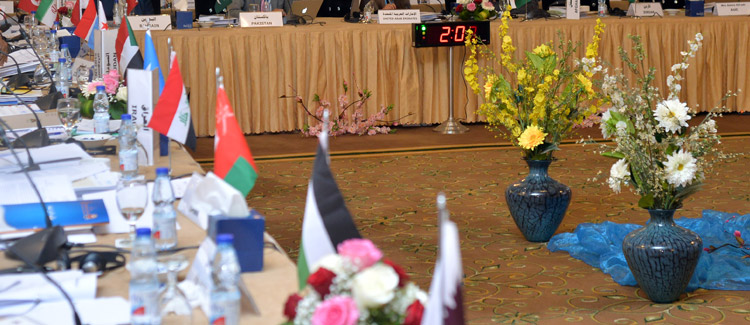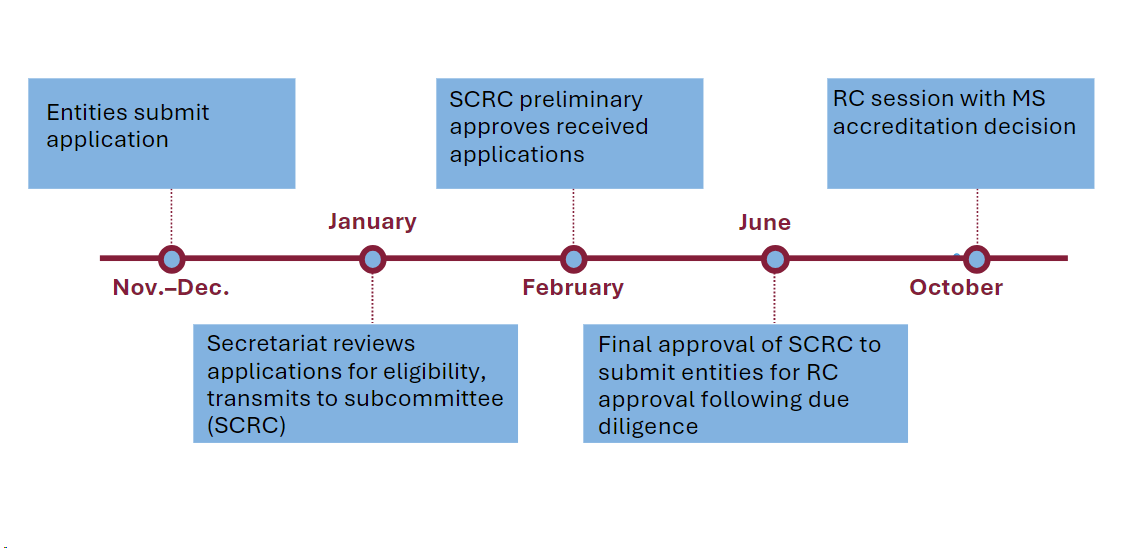
Process and timeline for application
Procedure following the accreditation decision
Contact for questions and submission of applications
Introduction and scope
Accreditation is a privilege that the WHO Regional Committee for the Eastern Mediterranean may grant to regional nongovernmental organizations, international business associations and philanthropic foundations. It includes an invitation to participate, without the right to vote, in meetings of the Regional Committee and the possibility to submit written and/or oral statements through WHO Regional Office for the Eastern Mediterranean.
The procedure is in line with article 57 of the WHO Framework of Engagement with Non-State Actors (FENSA, Resolution WHA69.10) and was endorsed by the 67th WHO Regional Committee for the Eastern Mediterranean (Document EM/RC67/16 and Resolution EM/RC67/R.5).
Eligibility criteria
To be eligible for application the non-State actor (the “entity”) should meet the following criteria:
a. The aims and purposes of the applicant entity should be consistent with the WHO Constitution and conform with WHO’s policies and should contribute significantly to the advancement of public health.
b. The entity should respect the intergovernmental nature of WHO and the decision-making authority of Member States as set out in the WHO Constitution.
c. The entity should have been in active and formal engagement with the WHO Regional Office for the Eastern Mediterranean for at least two years.
d. Membership and activities of the entity should be at the regional level.
e. The entity should not be a for-profit organization and/or commercial in nature and/or its activities.
f. The entity should have an established structure, constitutive act and accountability mechanisms.
g. The entity, if a membership organization, should have the authority to speak for its members and have a representative structure.
h. Entities shall designate a head of their delegation and declare the affiliations of their delegates. This declaration shall include the function of each delegate within the entity itself and, where applicable, the function of that delegate within any affiliated organization.
i. Entities participating in Regional Committee meetings, and committees and conferences convened under the Regional Committee’s auspices, shall designate a head of delegation for each session.
Application procedure and timeline
All applications for accreditation must be submitted to the WHO Regional Office for the Eastern Mediterranean by email at: This e-mail address is being protected from spambots. You need JavaScript enabled to view it .
The application must include:
- information about the nature of the entity: name, objectives, legal status, governance structure, composition of main decision-making bodies, assets, annual income and funding sources, main relevant affiliations and website address;
- a summary of past engagement with the WHO Regional Office;
- names and contact details of the entity’s and the WHO Secretariat’s focal points for collaboration;
- the entity’s acknowledgment of understanding and agreement that the provided information will be made public via the WHO Register of non-State actors. The entities might also be requested to enter information in the Register themselves.
a. Applications for accreditation shall reach the WHO Regional Office for the Eastern Mediterranean no later than 31 December at 18:00 Cairo time and should include information about the entity in line with paragraph 39 of FENSA, including: name, objectives, legal status, governance structure, composition ofmain decision-making bodies, assets, annual income and funding sources, main relevant affiliations andwebsite address.
b. Requests shall be reviewed with the support of the Regional Office to ensure that the eligibility criteria and other requirements in line with FENSA have been fulfilled and shall be considered by the Programme Subcommittee of the Regional Committee for the Eastern Mediterranean or a subgroup of the Programme Subcommittee in February.
c. Those applications approved by the Programme Subcommittee or by or a subgroup of the Programme Subcommittee in February shall be submitted to the Regional Committee in October or, alternatively, the Programme Subcommittee shall propose for the Regional Committee to delegate this responsibility to the Programme Subcommittee. The Programme Subcommittee in return shall report annually to the Regional Committee on this matter.
d. An accredited entity shall be reviewed by the Regional Office every three years, and its profile published on the WHO website and reported to the Regional Committee.
Timeline
By 31 December: Applications must be submitted to the WHO Regional Office for the Eastern Mediterranean. The Secretariat reviews the applications to ensure that the established requirements are fulfilled and prepares a report for the Programme Subcommittee of the Regional Committee.
February: Based on the report of the Secretariat, the Programme Subcommittee provides recommendations and a draft decision on granting applications for consideration by the Regional Committee.
October: The Regional Committee considers, amends when necessary and adopts the draft decision.

Procedure following the accreditation decision
The Regional Committee’s accreditation decision will be included in the Report of the Regional Committee, and the Regional Director will inform each entity of the Regional Committee’s decision on its application. The accreditation status will be reflected in the WHO Register of non-State actors.
The Regional Committee reviews collaboration with each accredited non-State actor every 3 years and decides on whether to maintain the accreditation status or to defer the decision on the review to the following year. Accredited entities must provide a report on collaboration with the WHO Regional Office for the Eastern Mediterranean through the Secretariat every 3 years, by the end of December. The report will be published in the WHO Register of non-State actors.
In line with FENSA articles 65 and 66, the Regional Director can also propose an earlier review based on experience of the collaboration with the entity concerned (in case of issues such as non-fulfilment of the entity’s part in the plan of collaboration, lack of contact, failure by the entity to fulfil its reporting requirements or changes in the nature or activities of the entity concerned, the entity ceasing to fulfil the criteria for admission, or any potential new risks for the collaboration). The Regional Committee may discontinue accreditation if it considers that such relations are no longer appropriate or necessary in the light of changing programmes or other circumstances. Similarly, the Regional Committee may suspend or discontinue accreditation if an entity no longer meets the criteria that applied at the time of granting the accreditation, fails to update its information, or fails to fulfil its part in the agreed programme of collaboration or to report on the collaboration.
Contact for questions and submission of applications
Governing Bodies, WHO Regional Office for the Eastern Mediterranean
This e-mail address is being protected from spambots. You need JavaScript enabled to view it




